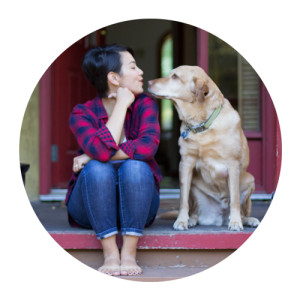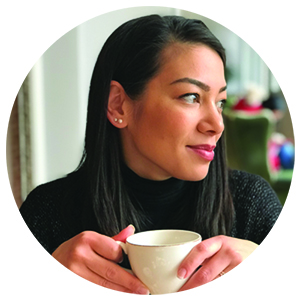This week, I invited my friend Alida Thomas to write on the word, Inquire. Alida and I started our graduate studies together at Trinity Western. We share both the rewards and challenges of being multi-hyphenates and I resonate with every word when she writes,

“I’m deeply compelled by our collective potential – locally, nationally, and globally – to address the pressing needs of systemic inequality and to build healthier more equitable ways of being with each other (in our shared humanity) and with our planet (in our shared belonging). I’m passionate about equity, diversity, inclusion, and justice; intersectional feminism; social and environmental justice; human rights; refugee rights and care for newcomers to Canada; and active and informed citizenship.”
I could not be more in love with what Alida wrote this week and am so grateful for her contribution to this space.
I grew up in a family that placed a high emphasis on the values of curiosity and kindness in all things, a legacy I am increasingly more and more grateful for. We were taught to be curious about people and places and things and ideas and to never stop learning in whatever avenues were available to us. Any venue would do: from formal or informal education, to reading and listening, to engaging in relationships with an openness to glean insights from the opinions, insights, or lived experience of the other person(s). I remember so clearly my Dad encouraging us to seek out the things about people that they loved or would get excited about. In doing so, we might just be opened us to a whole new part of the world we may not have previously been aware of. “Besides,” he would say with a cheeky smile, “passion is contagious.”
And yet, in a complex juxtaposition that has defined much of my life so far, I also grew up in a context that valued the collection of knowledge and intellectual rigour as a tool that was all too often used to reinforce dogma, or as a hierarchical way of reinforcing “authority.” The one who was “educated”, “capable”, was also “in-control.” These realities – which I credit to the intersectional realities of my race, my ethnic background, my geographic context, and my specific religious upbringing – sometimes stood in contrast to the kind of inquiry encouraged by my Dad, a truly invitational pathway to exploration or expansion of one’s ways of knowing and being in deeper understanding, curiosity, empathy, and solidarity with the world and with others.
Both perspectives valued inquiry and placed a high value on lifelong learning, but, as with many things, the posture of one approach was much more compelling than the other. And my life has only grown in depth and beauty the more and more I’ve leaned into the invitation of both learning and unlearning with the heartbeat of the first.
Brené Brown recently interviewed leading organizations psychologist, Adam Grant on her Dare to Lead podcast where they discussed his new book: Think Again. This fascinating book centres around what Grant calls “the critical art of rethinking: learning to question your opinions and open other people’s minds, which can position you for excellence at work and wisdom in life.” Poignantly Grant said, “In our daily lives, too many of us favour the comfort of conviction over the discomfort of doubt. We listen to opinions that make us feel good, instead of ideas that make us think hard. We see disagreement as a threat to our egos, rather than an opportunity to learn. We surround ourselves with people who agree with our conclusions, when we should be gravitating toward those who challenge our thought process. The result is that our beliefs get brittle long before our bones.”
To inquire with an openness to true learning requires both courage and humility.
Courage to admit that we may not see or know things in their entirety or in their accuracy. And humility to approach learning as a gift of exploration, not a shame-driven condemnation of what we may not have known, or may have known wrongly or incompletely, before. To inquire well means that we must take the posture of a learner, an explorer, a co-sojourner on the journey of being human.
In my life in the past few years, this has meant making a concerted effort to expand the voices I listen to or seek out on any number of topics, from theology to politics to recipes to current events. And it has meant placing an intentional emphasis on seeking out insight from people with different lived experiences or backgrounds than my own: from individuals who are Black, Indigenous, or People of Colour; who are socioeconomically marginalized, are part of the LGBTQ2S+ community, or who are members of the diverse and beautiful community of those we call “disabled” or “neurodivergent”; individuals with fancy credentials behind their names and individuals with vast lived experience and little formal education; individuals representing the full gamut of the political spectrum; individuals who have lived the refugee experience or who can speak first hand of the harrowing impacts of war and climate change and forced displacement. This has also meant listening to podcasts or books or TED talks on topics that are different from areas where I have studied or feel some kind of comfort or familiarity, like economics and botany and organizational psychology.
Writing all of this, I realize too that it may seem like inquiry demands that we always be moving and learning and growing and doing, but to that I would add a gracious caution. Growth, put simply, takes time, and like planting seeds in early spring while eagerly awaiting a harvest, the process often cannot be rushed. Learning and unlearning require both a compassion of thought, but also a compassion of self.
To inquire is to open oneself up to greater empathy, to more tangibly understood and expressed mercy, to deeper insights and to wider perspectives. Certainly, inquiry neither requires nor demands that you change your mind or alter your opinions, perspectives, or beliefs. In some places, it may in fact narrow or hone your already deeply held beliefs. It simply requires that you remain open to the possibility of expansion or of adding dimension to that which you already know and think you understand.
Adam Grant said it well: “If knowledge is power, knowing what we don’t know is wisdom.” This is a wisdom I want to keep growing in. What wonder to think that there is still so much more to be learned, to be discovered, to be contemplated, to be experienced, and to be known!
So explore. Dive deep. Let new depths of insight, information, and inquiry expand your imagination. Let them enlarge your awareness, and hopefully, your kindness and generosity of being in the same breath.
This post is part of the 2021 Writing Challenge. This challenge is open to anyone and involves writing on one word a week for 52 weeks. Write for yourself or write for others but either way, please feel free to share by posting a link in the comments (if you’re posting on this week’s word) or post on social using the #2021writingchallenge and tagging me on Twitter or Instagram, or posting on my FB page so I can repost. Happy Writing!















Leave A Reply